“Mudd’s Passion”
Written by Stephen Kandel
Directed by Hal Sutherland
Animated Season 1, Episode 10
Production episode 22008
Original air date: November 10, 1973
Stardate: 4978.5
Captain’s log. The Enterprise is pursuing Harry Mudd to the Arcadian system, specifically the planet Motherlode, where Mudd is peddling a love potion to the heavy-metal miners down there. Motherlode is outside Federation jurisdiction, but when Spock exposes his love potion as a fake—the “woman” he used as a model was actually a Rigellian hypnoid—he turns himself in rather than face the wrath of the miners.
Mudd explains that he managed to escape the robot planet in a “borrowed” ship, sold Starfleet Academy to the Illyrians (which is how he got on the Federation’s radar), then discovered the love potion on Sirius IX, but when he sold the potion to the Sirians, they all got sick, which Mudd blames on the Sirians’ biochemistry.
Chapel treats Mudd in the brig, and he observes Chapel’s unrequited love for Spock, so he talks her into taking the love potion and trying it on herself and Spock. She agrees to take it and analyze it. For science. Yeah. While giving it to her, Mudd palms her phaser and ID card, using the former to break out of the brig, and altering the latter to have his own face on it.
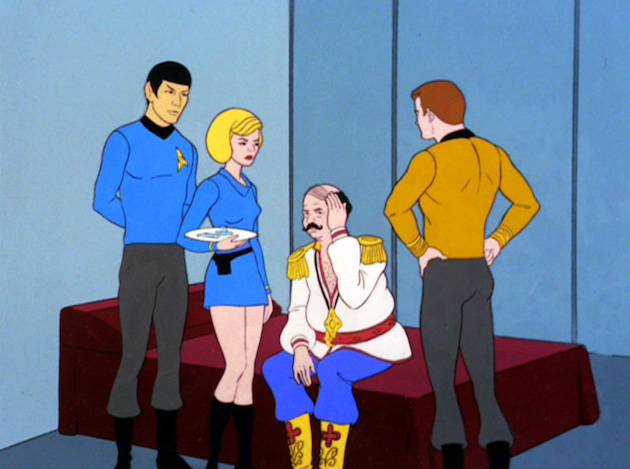
For her part, Chapel heads to Spock’s quarters to hand over Mudd’s medical record for the arrest report. Chapel “trips” and touches Spock. Nothing happens, so Chapel heads back to the brig, only to find that Mudd escaped with her weapon and ID. She tracks him to the shuttlebay and clubs him on the head.
However, it turns out the love potion does work, it just takes a little time to kick in. Spock becomes smitten with Chapel, and immediately reports to Kirk and McCoy that he’s feeling strange emotions.
Mudd tries to offer Chapel another crystal, thinking maybe the one was defective, but she won’t have any of it. However, when she tries to subdue him, the love potion is sucked into the ventilation system and Mudd manages to subdue Chapel and take her hostage, though not before she calls a security alert.
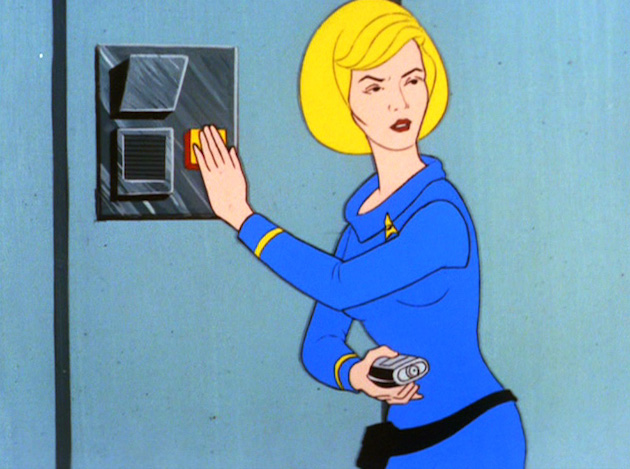
The Enterprise is investigating a Class-M planet in a binary star system. Mudd takes Chapel into a shuttlecraft and heads to the planet. Spock, completely obsessed with Chapel, insists on leading the landing party himself. Kirk agrees, but goes with him. They beam down—Spock being very impatient on the subject—and declare their friendship for each other with smiles on their faces.
Meanwhile, the love potion gets into the air on the ship. M’Ress and Scotty start flirting, Arex starts playing a musical instrument, and everyone’s all happy and stuff—to the point where they’re no longer paying attention to their work.
The giant rock formations on the planet turn out to be large living creatures. They chase Mudd and Chapel, crushing the shuttle along the way. Phaser fire is barely effective, and Spock is too busy mooning over Chapel to focus on anything else. Mudd is rather shocked to discover that the potion actually works…
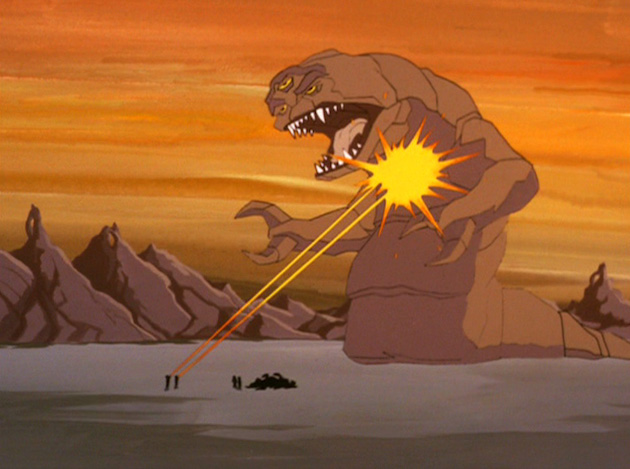
Turns out that it only works temporarily—the love and happiness is followed by intense headaches and hatred.
Kirk uses the last two crystals on the rock creatures, at which point they focus on each other. That distracts the creatures long enough for the Enterprise to snap out of their funk and beam them back. Mudd gives a full confession to Chapel, who snaps at Spock, as she’s now all pissed at him.
Fascinating. Spock acts like a lovesick goon toward Chapel, and also says to Kirk that his idea is a stupid one.
I’m a doctor not an escalator. When affected by the love potion, McCoy chats up a female crew member with tales of all the times he’s saved the lives of the senior staff.
Hailing frequencies open. M’Ress runs communications, and also the science station when Spock is on the planet, with Uhura not actually seen in the episode, though McCoy does mention her.
I cannot change the laws of physics! Scotty is very annoyed that the love potion gives him a hangover without the benefit of having drunk Scotch first.
Forewarned is three-armed. Arex plays a nifty lute-like instrument when the crew is in the happy phase of the love potion.
No sex, please, we’re Starfleet. Chapel’s unrequited love for Spock leads her to try the love potion on Spock. It does not go well for either of them. Meanwhile, M’Ress hits on Scotty and McCoy hits on an unidentified crewwoman.
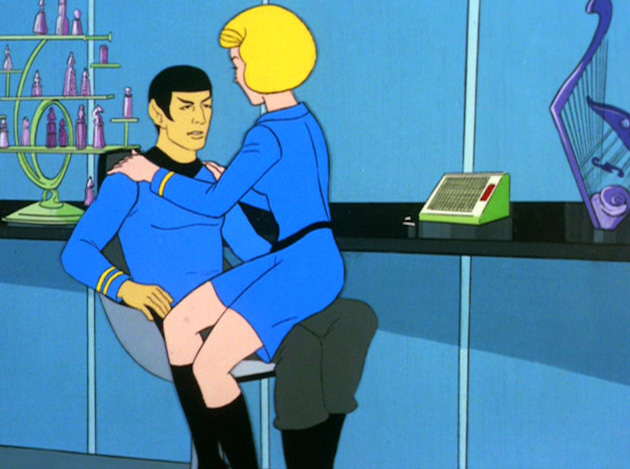
Channel open.
“That is an outstandingly stupid idea.”
–Spock’s best line since saying, “I am a fool” in “The City on the Edge of Forever.”
Welcome aboard. Roger C. Carmel reprises his role of Mudd, playing him for the third time, and also making him the third (and last) actor outside the main cast to reprise his role on the animated series after Mark Lenard and Stanley Adams.
The rest of the voices are provided by James Doohan (Scotty, Arex), Nichelle Nichols (one of the miners), and Majel Barrett (Chapel, M’Ress, the hypnoid). The human miner’s voice sounds like one of Filmation’s stock cast of voice actors.
Trivial matters: This episode marks the third appearance of Mudd, and the last on-screen one, though he’s seen in multiple works of tie-in fiction, as listed in the rewatches for “Mudd’s Women” and “I, Mudd.”
Just as with the other two episodes, this one was written by Stephen Kandel (though David Gerrold did an uncredited rewrite of “I, Mudd”).
This is the first time Starfleet ID cards are seen—they’ll be glanced again in some of the movies.
Your humble rewatcher identified the lute that Arex was playing as a lood dir in the novel A Singular Destiny.
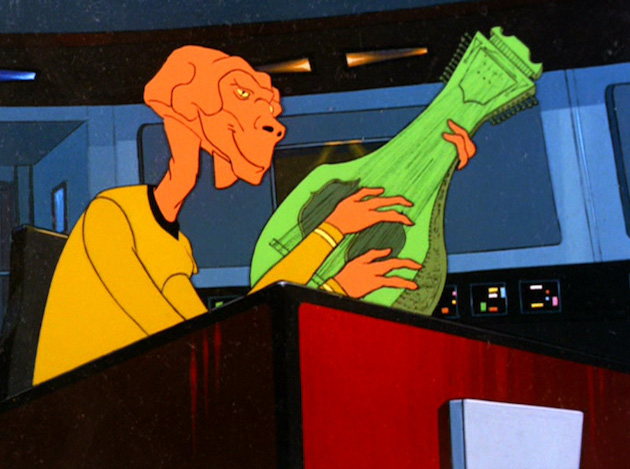
To boldly go. “My dear friend, Spock.” This could’ve been a good episode. Stephen Kandel’s script actually isn’t too bad, if a bit simplistic. But this is a case where the fact that it’s an animated series, and in particular that the voice actors weren’t recorded together, hurts it. Mudd’s recitation of what he’s done since “I, Mudd” is, as written, a nice call-back to the similar scene in that earlier episode of what Mudd had been doing since “Mudd’s Women“—Mudd talking in euphemisms, and either Kirk or Spock “translating” into more blunt terms. Unfortunately, with the actors unable to play off each other directly, the timing on the scene is entirely off-kilter, and the humor is drained from it.
Leonard Nimoy’s inexperience with voiceover work at this stage in his career shows through, as his performance here as a lovesick goon is so much doofier than his like performances in “The Naked Time” and “This Side of Paradise” and “All Our Yesterdays.” There’s no nuance, and it’s just painful to observe. It doesn’t help that we’re denied Nimoy’s facility for subtle facial expressions.
This also harms Roger C. Carmel’s performance, as the joy of watching Mudd is as much in Carmel’s facial expressions and especially his body language. Filmation’s crude animation can’t re-create that, instead giving Mudd a near-permanent used-car-salesman smile that doesn’t do the character any favors. (Also, what happened to that poor Rigellian hypnoid? Spock shot it and then it just wandered off. They could’ve at least taken it into custody or found it a home or something.)
Finally—and this is entirely on the back of Kandel—the episode is a major insult to the character of Christine Chapel, who falls for Mudd’s lame confidence scam, allows her phaser and ID to be taken (which she doesn’t notice for a good ten minutes or so), and then manages to come out a loser in a confrontation in which she has a phaser on an unarmed person. Yeah. (Also, why is it so easy to alter a Starfleet ID? Seriously, it’s harder to alter a driver’s license now…..)
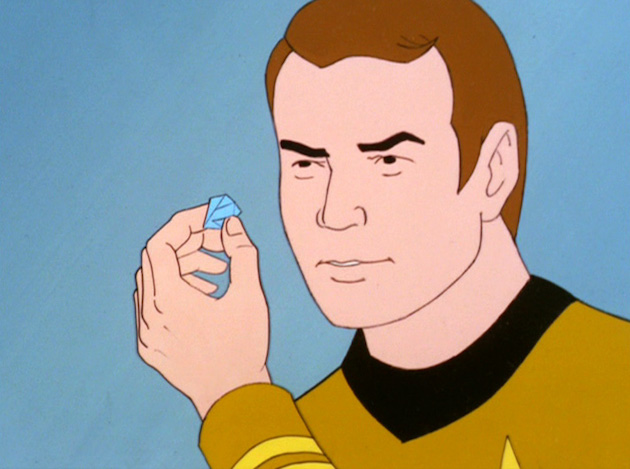
It’s fun to have Mudd back, but the episode has too little humor, and not enough bite, plus the love potion plot has whiskers on it. Just a major disappointment.
Warp factor rating: 3
Next week: “The Terratin Incident”
Keith R.A. DeCandido‘s latest work is on sale today! The third Super City Cops novella, Secret Identities, is now out, following up from Avenging Amethyst and Undercover Blues. Telling the story of cops in a city filled with superheroes, these novellas are published by Bastei. For ordering information, cover, promo copy, and an excerpt, check out Keith’s blog. (There’s also an excerpt from Avenging Amethyst right here on Tor.com.)










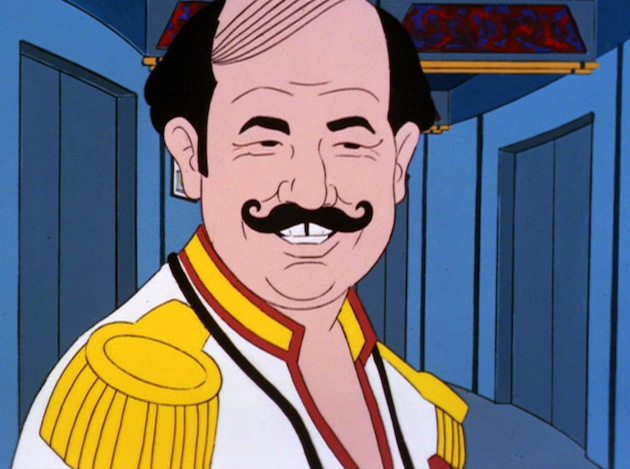
You haven’t mentioned the worst part, at least in my opinion: Chapel deliberately drugs Spock with a love potion. That’s something completely different from expressing her love for him under the influence of an alien virus. What a terrible, sexist episode. Can we please pretend that it never happened?
Oh, and Harry Mudd used to be much taller.
Jana: Indeed.
—Keith R.A. DeCandido
You can tell it is the 70s. Roofie-ing someone is considered acceptable cartoon fare. Yeah. The date rape drug episode. I’m sorry but I don’t have much more to say about this other than that. Ugh. I mean I am no fan of the Animated Series at the best of times, composed as it was mainly of scripts rejected as being too rubbish even for Season 3 of the Live Action Show, but this is down there. Still not the worst episode though. Close, but the worst is still to come.
I think you were too generous, Keith — the faults in this episode are at least as much due to the writing as the execution. The humiliating treatment of Chapel is the worst of it, but the whole love-potion thing is generally pointless and doesn’t go anywhere — not to mention, why doesn’t the ship’s air circulation system have any kind of filters? The idea that a vent in the hangar bay could just waft stuff directly to the rest of the ship without anything to block it doesn’t make much sense, considering that the hangar bay is frequently open to the vacuum of space.
There are also the issues that wouldn’t have been red flags in the ’70s but are pretty awful in retrospect, like the unquestioned heteronormativity of how the drug works and, far more creepily, the fact that Harry is basically selling a rape drug and it’s being played for laughs.
Still getting some significant animation errors too, like Scotty getting a close-up in the transporter room even though he’s on the bridge in the bracketing scenes, Spock entering the bridge from opposite the turbolift when he comes to report his emotions, and Kirk being replaced by a redshirt in one shot on the planet surface. And the climactic action with the rock monsters is confusing. I think what’s happening is that the roofied monster touches Kirk, develops affection for him as a result (I wonder if it was male or female?), and then attacks the other rock monster to protect him, with their flailing nonetheless almost crushing the landing party. But it’s hard to tell.
The main thing that’s always bugged me about the rock monster sequence, though — aside from the implausibility of such giant life forms to begin with — is the question of dosage. Even if the monsters had a compatible biochemistry, how could those two tiny crystals (although there were significantly more than two in the shot where Kirk threw them) contain enough of the potion to have any effect on a creature that size?
I am a bit curious about the ursinoids and the other alien seen in the crowd on Motherlode. I don’t think they’ve ever been used in any of the tie-ins. I did, however, feature Rigelian hypnoids in Rise of the Federation: Tower of Babel.
I appreciated a little more expansion of Christine Chapel, but yeah, what they did with her wasn’t good. She should have been a strong character, and this is what they did. Still, I like when minor characters get more attention.
4. ChristopherLBennett – “why doesn’t the ship’s air circulation system have any kind of filters? The idea that a vent in the hangar bay could just waft stuff directly to the rest of the ship without anything to block it doesn’t make much sense, considering that the hangar bay is frequently open to the vacuum of space.”
The same thing happened with the impulse vent in Obsession. Leave a vent open on your engine and a cloud creature gets right into the ventilation system. It’s dumb but there is precedent for it in the live action.
Yeah, this one is pretty dire. The less said about Chapel, the better since she basically does nothing right at all.
There are some bits I do like, although they really don’t have much to do with the plot. It’s nice to see that Motherlode isn’t a Federation planet and Mudd points this out to Kirk. It’s nice for them to be reminded that the Federation isn’t above the law.
We also get a new shuttlecraft although it really doesn’t make a lot of difference. Harry says he’ll drop her off and be on his way so why not use the long range shuttle? At least the aquashuttle had a new capability we hadn’t seen before but there’s no reason given for the new one. But, new designs are always welcome so we’ll let it pass.
Would rock monsters have the same gender identifications as humans? Why should they? I’d imagine that they’re silicon based or perhaps simply well disguised animals like dinosaurs. Their hides simply look like rock. Or, perhaps, they’re simply covered with a silicate shell.
One question at the end though, why is a nurse recording Mudd’s confession? Wouldn’t that be a job for the yeoman? And if Mudd’s giving a confession, where’s his legal representative? Or is it a situation like Journey to Babel where the prisoner is given a verifier scan and truth drug with nary a lawyer to be found? We know that starfleet officers have been ordered to act as both prosecutor and defense. Why not now? Just to let Chapel get off a snarky comment? After her actions she’s lucky she’s not in the brig.
I haven’t seen this episode, so pardon me if I’m completely off base here, but does this qualify as a case of female on male sexual assault as humor? Because I can’t imagine the reverse situation treated in such a light-hearted fashion, even back in the 70s.
7. Denise L. – In the TOS episode The Enemy Within, evil Kirk attempts to rape Janice Rand and Spock has this to say at the end of the episode. “The, er, impostor had some interesting qualities, wouldn’t you say, Yeoman?”. Yeah, he may have tried to rape you but yo actually enjoyed it, didn’t you? So, no humor as in “ha ha” but certainly making light of it.
@/DeniseL In the second season of Saturday Night Live in 1977, they actually did a bit about a man starting a rape hotline–for rapists. Yikes.
Rape jokes were a big thing once. Just watch any classic British sitcom for a start. It is depressing.
@7/Denise L.: Harry initially pitches the drug by claiming he’s used it to make a beautiful woman (actually the hypnoid) fall in love with him. So it’s used by both men and women (and Chapel only tries it on Spock at Harry’s goading, so there’s still a man initiating it, essentially). The thing is, using a love potion wouldn’t even have been seen as sexual assault at the time. The idea that rape could be anything other than a violent attack was not yet understood by society (or at least by men). Using trickery or alcohol or magic to win someone’s heart (or body) was seen as, not exactly kosher or playing fair, but not an assault either.
Also, the idea that romantic love automatically equalled sex hadn’t quite become the norm yet. Even though the sexual revolution had kicked in, the conventional expectation was still that people who fell in love would wait to have sex until things got serious, or until their wedding day depending on how culturally conservative they were. So something like a love potion would’ve been seen as more of an emotional imposition than a sexual one, at least if it wore off before that point was reached. Certainly in the context of a TV episode for Saturday morning, the love in question was presumed to be chaste.
Yeah, don’t forget this is a Saturday morning kids show, based on a live-action series that was pretty kid friendly as well. A love potion doesn’t equal a sex potion or roofies or rape; that’s a discussion better suited for later Treks. The real danger here was a ship-wide epidemic of cooties.
@12/Cheerio: Well, TAS was specifically conceived as a show aimed at adult viewers despite its time slot, although it did have to be appropriate for younger viewers. As for TOS, people today find it tame, but it was quite risque and adult by the standards of its time, always pushing the envelope of censorship where skin and sexuality were concerned. I mean, it had an episode about its second lead being compelled to return home to mate. It had an episode that talked about contraception as a form of population control. This was daring stuff for the 1960s. The “tame” treatment of love and sexuality had nothing to do with being “kid-friendly”; the adult dramas of the era were rarely any more frank about such matters.
True, but I was referring more specifically to the issue of rape. I don’t think it was ever directly a topic in Star Trek, was it? Though I do remember the one where Evil Kirk attacks Rand. I mean, you were more apt to see that kind of thing addressed in something like Perry Mason, weren’t you?
Anyway, it seems to me this episode’s use of a love potion is for Pepe LePew-ish plot reasons and little else. Or if nothing else than to see the crew behave abnormally, like in The Naked Time.
@14/Cheerio: Gene Roddenberry would not have accepted the distinction you’re suggesting. His specific purpose in creating Star Trek was to make the first continuing science fiction adult drama on US television. The fact that it was made on an adult level — something essentially unprecedented for any non-anthology genre show at the time — was a point of pride to him. When he cited his models for the approach and tone he had in mind, he cited the acclaimed adult dramas of the era, like Gunsmoke, Naked City, and Wagon Train. He’d gained a lot of experience working on Have Gun — Will Travel, a Western acclaimed for its unusual intelligence and sophistication, and he always aspired to make shows in that vein, shows that were smart and thoughtful and innovative and made a statement. The fact that people tended to jump to the conclusion that Star Trek was a cheesy kids’ show just because it was science fiction must have been a great source of frustration to him. And the nominal kid-friendly nature of TAS is probably part of the reason he disowned it in later years.
Anyway, any ’60s show that dealt with rape would’ve done so very demurely by the standards of later TV. I mean, we’re talking about a time when network censors woudn’t even let women’s bellybuttons be shown onscreen and actors were absolutely forbidden from opening their mouths when they kissed. If rape were talked about at all, it would be mostly very indirect and implicit, left to the viewer to fill in what was unsaid.
And yes, TOS did deal with sexual assault on multiple occasions. In addition to Evil Kirk’s attack on Rand in “The Enemy Within,” there was Don Juan’s uniform-ripping attack on Yeoman Barrows in “Shore Leave,” Tula’s implied rape during the Red Hour in “The Return of the Archons,” Apollo’s angry assault on Carolyn Palamas in “Who Mourns for Adonais?” (which was scripted as leaving Palamas pregnant, though that was cut), Lars’s failed “selection” of Uhura in “The Gamesters of Triskelion,” the villager’s attempted gang rape of Nona at the end of “A Private Little War,” and the crazed Chekov’s attack on Mara in “The Day of the Dove.” Not to mention the Platonians’ attempt to force Kirk, Spock, Uhura, and Chapel to have a torture orgy for their amusement.
This ship has a crew of 500, yet all Mudd needs to pass unnoticed is an altered ID? And the face of the person they went into this system to apprehend wasn’t put up on screens all over the ship?
My theory on the crystals is that the love potion isn’t biologically based. The crystal matrix can store a telepathic/empathic image–in this case, the emotion of romantic love. Maybe Harry lied and the truth is he raided a telepathic race’s library and cleaned out the romance novels. It’s just that all nontelepaths get from them is the dominant emotion of the plot. It’s just as well he didn’t get the horror fiction.
In that case, maybe Kirk used a non-romance novel on the rock creature and, if he had the universal translator on, he would have heard it yelling, “My name is Inigo Montoya! You killed my father! Prepare to die!”
@5/MeredithP: Me too, I would have liked a good Chapel story. I guess the character was off to a bad start because the first thing we learn about her in “The Naked Time” is her infatuation with Spock. But on her next appearance, we learn that she used to be a biological scientist who took up the job of nurse to get on a starship and search for her missing fiancé. That’s a good backstory, and it’s never used again.
I think this suffers some of the same problems as the Tribbles episode. Recycling ideas with stiff performances. Definitely a waste of Roger Carmel.
We had Mudd’s Women and I, Mudd by this point. The problem with this TAS episode is that it tried to appropriate ideas from the wrong episode. The rape drug as shown here isn’t that different a concept from the Venus Drug established on the original episode. Kandel and Fontana really should have either tried to follow up on events from I, Mudd or go in a complete different direction.
If anything, I’m appalled Fontana approved this outline at all, given the way the story treats Chapel. For that matter, I wonder why Barrett never questioned this decision or try to protect the character’s integrity.
On the other hand, I can’t help but enjoy some of the lovesick crew moments. I actually think the crude limited animation was an asset in this case, allowing for a more surreal portrayal of this contamination. M’Ress with Scotty was definitely an interesting pairing. I wonder if this was the inspiration for the Scotty/Uhura romance briefly depicted on ST5. I’m impressed this got past censors at all, given the potential bestiality implications (M’Ress is an intelligent humanoid, but I doubt they would make that distinction) – and that’s not adding the cosplay/furry possibilities.
@16/Ellynne: The dialogue established that the love potion was a liquid inside the crystals — you break open a crystal (or “capsule,” as Chapel called it) and rub the liquid on the skin. And it’s rather remarkable, by the way, that a single drug can be delivered through dermal absorption, inhalation of its vapors, and ingestion and have the same effect in every case.
@17/Jana: I think I’ve previously mentioned the rather creepy fact I learned recently about Roddenberry’s original character notes for Spock: His intention was that Vulcan males had an overpowering hypnotic effect that made them irresistible to humanoid females. This was supposedly necessary to overcome the emotional reserve and frigidity of Vulcan females (which is more than a little rapey in itself). Spock was uneasy with the effect he had on women and tried to resist it, but they couldn’t help but fall in love with him. Which casts Chapel’s behavior in “The Naked Time” and Leila Kalomi’s in “This Side of Paradise” in a rather disturbing new light.
@18/Eduardo: The episode’s treatment of Chapel isn’t really that much worse than how she was treated in TOS or than a lot of female characters were treated in ’60s and ’70s TV. If anything, it’s relatively progressive for that era. The very fact that Chapel initially resists her emotions and tries to act like a scientist, rather than being purely a lovestruck slave of passion, is a comparatively positive portrayal for the period. As is the fact that she was allowed to confront Harry with a phaser and have a physical confrontation with him at all, even one she lost.
As for Scotty/M’Ress, as I said before, people back then didn’t equate romance/flirtation with actual sex as automatically as we do today, so things that we tend to see as fetishistic or creepy were viewed more chastely. Besides, there was a long tradition of anthropomorphic cartoon animals showing romantic interest in humans, e.g. the Wolf in Tex Avery’s Red Hot Riding Hood and similar cartoons, or Donald Duck’s rather aggressive pursuit of live-action bathing beauties in The Three Caballeros. Everyone understands that anthropomorphic cartoon animals aren’t actual animals, so it has nothing to do with “bestiality.” And as for M’Ress, whatever her “catlike” appearance, she’s simply an alien, and it’s no more an act of bestiality than Sarek marrying Amanda.
Part of the thing is, these days, society talks far more openly about sex crimes than it did in the past, so people are more aware of the reality of those things, and that’s where our minds go when we see similar concepts in fiction. So we see them as creepy because of the real-life exploitative acts they remind us of. But society in the past didn’t talk as openly about things like rape and sexual predation and pedophilia and the like, so people weren’t as aware of them as real-life problems. And so a fantasy story about a love potion wouldn’t have been as likely to remind its audience of the real-life phenomenon of date-rape drugs, and a song like “Thank Heaven for Little Girls” wouldn’t have been as likely to remind people of pedophilia, and so forth. So they would’ve been perceived as more innocent and less creepy.
@18/Eduardo: I like the McCoy scene, especially the elegant transition from bragging to flirting.
M’Ress’ collar changes its colour and style back and forth in that scene with Scotty: from red turtleneck to standard uniform collar and back again.
@20/Jana: I’ve never liked the McCoy scene, because it’s not how “Did I ever tell you about the time I…” boasts are supposed to work. He never actually does tell her about any of them. He just claims he’s saved them and doesn’t go into any specifics about what he actually did. Who boasts in such a superficial way?
@19/Christopher: True, that’s a creepy backstory for Spock. I’m glad we never saw any of it on screen.
As for the episode’s treatment of Chapel, I think it is worse here. Unrequited love is one thing, using a love potion on a collegue is quite another. Even if it’s not seen as a rape drug, her actions are highly unprofessional and seriously disturb the running of the ship. This is not how she or any other female crewmember (except perhaps McGivers) were portrayed in TOS proper.
@21/Christopher: “Who boasts in such a superficial way?” – No one. That’s what makes it funny.
On the one hand… I don’t like any of the Mudd episodes. Mostly because I don’t like Mudd. The love potion crystals are sort of a rehash of the happy flowers from This Side of Paradise, combined with Mudd’s original beauty potion scam in Mudd’s Women, and they could have been a really effective subtle horror plot, as the crew slowly realized that they weren’t themselves. (Glancing through the comments, I’m glad I’m not the only one who is not comfortable with the roofie crystals. Trek’s had quite a record of male characters being given mind-altering substances to manipulate them, [Elaan of Troyus and A Private Little War come to mind] but this one’s very unambiguously because Chapel decided she was going to change Spock’s mind for him. Sure, the 70’s weren’t good at recognizing that this was wrong, but I’d hope we’ve learned better now.)
On the other hand, things for Chapel to do… I just wish that any of them were something other than “act like a complete fool to enable the plot.” Not to mention, she’s a nurse, she should know better than to expose other crew members to an untested substance! Especially Spock, whose hybrid biochemistry could go all sorts of wrong with weird alien substances.
@19 – Chris: “But society in the past didn’t talk as openly about things like rape and sexual predation and pedophilia and the like, so people weren’t as aware of them as real-life problems. And so a fantasy story about a love potion wouldn’t have been as likely to remind its audience of the real-life phenomenon of date-rape drugs, and a song like “Thank Heaven for Little Girls” wouldn’t have been as likely to remind people of pedophilia, and so forth. So they would’ve been perceived as more innocent and less creepy.”
And that attitude towards these things is one of the reasons why rape and sexual predation and pedophilia were not seen a real-life problems. It’s a vicious circle, cause and effect at the same time.
@22 – Except we did see some of that backstory on screen. That characteristic was transferred to the Deltan species with the character Ilia in The Motion Picture. Roddenberry apparently really liked that “irresistible sex appeal” idea.
@25/Crusader75: There’s a similarity, yes, but those two were filtered very differently through Roddenberry’s gendered assumptions. Ilia probably owes more to the Orion women of TOS, and Nona, and Elaan, and the archetype of female sexuality as an overpowering trap going back to the Sirens of myth. (Even TAS did it with “The Lorelei Signal.”) Ilia was a temptation that Will Decker had had the will to resist in the past, like Pike and Kirk had had the will to resist those other temptations. Spock was the one who needed to exert the restraint to control his own irresistibility when the women around him were completely willing to succumb. In both cases, it was the woman who presented the temptation and the man who had to choose not to give in to it.
Of course, in principle, the Deltans’ “oath of celibacy,” their choice to control their natural sexual inclinations and not take advantage of more sexually immature species’ inability to resist them, is pretty much exactly the same kind of thing as Roddenberry’s take on Spock. But Roddenberry didn’t really write it that way, because he wrote from a male perspective.
This is another of my favourite TAS episodes. It’s great fun, though it did absolutely nothing to displace “I, Mudd” as the best Harry Mudd episode.
@22- As much as we’d all like to forget it, Spock’s supernatural power over women did, in fact, make it to the screen in “The Omega Glory”. That was a first season Roddenberry script, dusted off for a desperate third season…
(On a side note, it’s interesting that “Elaan of Troius” is mentioned here as another “roofie” episode, but in the actual rewatch comments, the fact that KIRK was on the receiving end of 60s sexism was never even mentioned in passing…)
@28/Jackanapesink: A desperate second season. And almost my least favourite episode, which is why I tend to forget specific details.
@28/Jackanapesink: You’re mostly right about “The Omega Glory,” but it was actually the penultimate episode produced in the second season.
D’oh! Thanks for the gentle upbraiding…I don’t know what I was thinking…maybe I was just conflating a bad episode with a bad season…LOL
Jackanapesink: well, “The Omega Glory” is sufficiently awful, it’s easy to mistake it for a third season episode. Ditto “The Gamesters of Triskelion”…….
—Keith R.A. DeCandido
@32/krad: But ideologically, “The Omega Glory” is a typical bad second season episode. Cold war metaphors, stereotypical enemies and problem solving by violence. The third season is much nicer.
@33/Jana: I wouldn’t say “Glory” solved problems by violence. Okay, stopping Tracey, sure, but mainly Kirk solved the problem by speechmaking and invoking noble ideals, however cornily.
@34/Christopher: I was mostly thinking of the Yang-Kohm war.
@35/Jana: But it was the villain, Tracey, who resolved the war with violence. The criticisms of season 2 in these rewatches were about cases where the heroes solved the problems with violence, say, by blasting the bad guys from orbit instead of reasoning with them.
@36/Christopher: No, I’m not talking about Tracey. I’m talking about the Yang attack on the village, as related by Tracey: “They sacrificed hundreds just to draw us out in the open. And then they came, and they came. We drained four of our phasers, and they still came. We killed thousands and they still came.”
I think we’re supposed to see this as a good thing, because we’re supposed to root for the Yangs, but I find it unsettling. Kind of war-glorifying. Very different in tone from all the anti-war stories in the first season. It’s true that it isn’t our heroes who conquer the village, but it’s still the people who have been established as the good guys.
@37/Jana: I don’t agree that the Yangs have been established as the good guys — at least, not as good as they could be. After all, the point is that they’ve forgotten the meaning of their “holy words” and have sunk to living like “savages” until Kirk reminds them of their ancestors’ true principles. In the episode’s heady mix of racisms, the former white/American Yangs have degenerated to acting like ’60s TV American Indian tribes. Cloud William even talks in a manner not unlike the stereotyped “Indian” voice. Their warlike nature is part of that behavior, and it’s up to Kirk to remind them of what it really means to be Amurrican.
38. ChristopherLBennett – Their warlike nature is part of that behavior, and it’s up to Kirk to remind them of what it really means to be Amurrican.
Did you have to bite your lip to keep from laughing when you wrote this? Do you have any idea how many wars America has been involved in? How many American military bases there are around the world? The fact that the military budget exceeds that of the next twelve countries combined?
Warlike nature is not part of being American? Really?
@38/Christopher: You’ve got a point, so let me rephrase my original comment. Usually when there’s a war in TOS, there’s a sense of tragedy to it. This sense of tragedy is missing in “The Omega Glory”, and that’s a flaw that’s more typical for the second than for the third season.
@39/kkozoriz: I understand comment #38 as Christopher talking about the episode’s message, not about actual facts. He even distances himself from it, hence the spelling “Amurrican”.
41. JanaJansen – I understand that but the “American” values are just as stereotyped as the “’60s TV American Indian tribes” that he mentions. It’s like thinking that Mayberry is an accurate representation of a small American town. The whole episode is laughable from start to finish. It’s even a Canadian extolling the virtues of the constitution to the natives. The fact that they’re the “good guys” because they’ve got the flag and constitution is just the cherry on top of a really bad sundae.
This episode made me laugh and laugh and laugh. 10/10